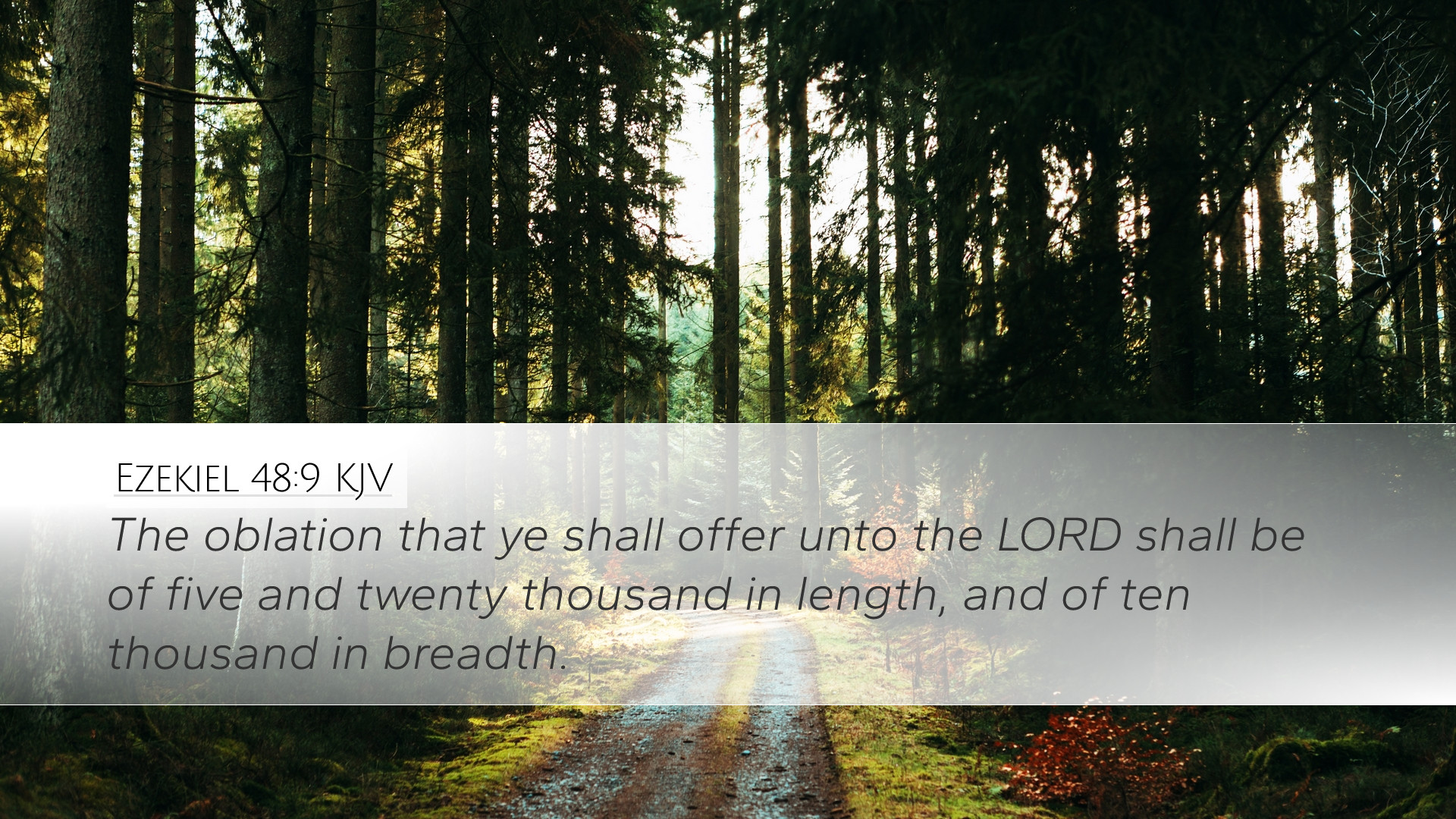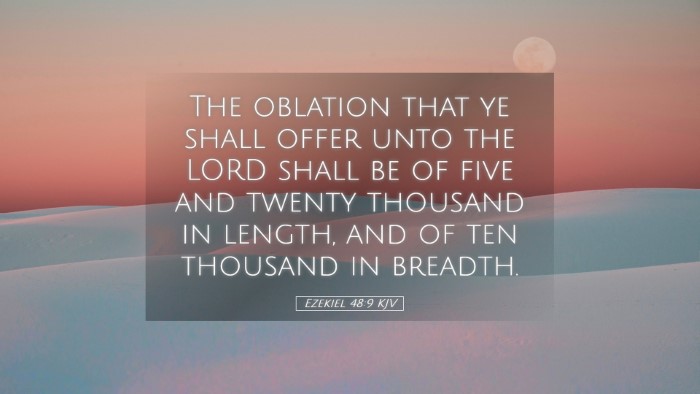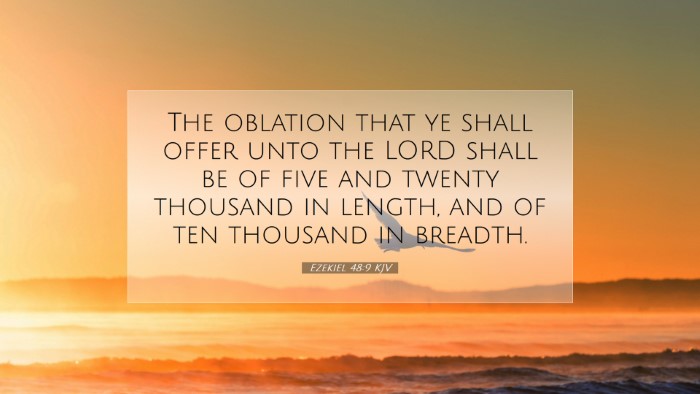Ezekiel 48:9 - A Commentary
Verse: "The portion that you shall set apart for the Lord shall be twenty-five thousand cubits in length and twenty thousand in breadth. It shall be the most holy place; the sanctuary of the Lord." (Ezekiel 48:9, ESV)
Introduction
The prophetic vision of Ezekiel culminates in significant details regarding the re-establishment of Israel, including the division of the land and the specifications for the sanctuary. Ezekiel 48:9 is pivotal as it details the dimensions set apart for the Lord's sanctuary, emphasizing the importance of holiness in the lives of God's people.
Contextual Analysis
In understanding Ezekiel 48:9, we must consider its context within the whole of the book of Ezekiel. Chapters 40-48 comprise a detailed vision of the new temple and the arrangement of the land. These chapters reflect a future hope for Israel, symbolizing restoration and divine presence among the people, which contrasts sharply with the desolation experienced during the Babylonian exile.
Historical Setting
Ezekiel, prophesying during and after the Babylonian captivity, addresses a disheartened nation. The Israelites faced immense loss and despair as their temple lay in ruins. In this context, Ezekiel's vision serves to reaffirm God’s intentions to restore His people and restore worship, signifying His continued covenant with them.
Thematic Significance
The dimensions of the Lord's sanctuary, as outlined in Ezekiel 48:9, carry profound thematic significance. The deliberate specification of measurements reflects God's desire for order, beauty, and intentionality in worship.
Divine Ownership
Matthew Henry emphasizes that the land set apart for the Lord signifies divine ownership. The dimensions speak to God's claim over Israel, indicating that while the land is divided among the tribes, there is a sacred portion reserved. This represents God’s unwavering presence amidst His people.
A Call to Holiness
The notion of a "most holy place" undergirds the call to holiness among the community. Adam Clarke notes that the designation of this space underscores the importance of purity in worship and life. The setting apart of space invites the people to reflect on their relationship with God and the requirement for holiness—a theme reiterated throughout scripture.
Interpretative Insights
The interpretation of this verse has seen various reflections across different commentaries, each contributing rich insights for both theological study and practical application.
Matthew Henry's Perspective
Matthew Henry outlines that this set-apart space reflects God’s glory and the community's dedication to Him. He posits that the sanctuary’s size signifies an extensive capacity for worship, welcoming the multitude while maintaining the reverence due to the Holy One. Moreover, he notes the importance of heart posture in approaching God, suggesting that the physical dimensions ought to inspire a spiritual realization of our great and needful dependency on divine grace.
Albert Barnes' Analysis
Albert Barnes highlights the eschatological implications of this verse. He suggests that the sanctuary points to the ultimate restoration of worship where God dwells among humanity in a way yet to be fully realized until the end of ages. Barnes elaborates on the significance of the temple in the Jewish tradition, likening the dimensions of the sanctuary to both a literal and symbolic dwelling place for the Lord, reinforcing the theme of divine presence.
Adam Clarke's Reflections
Adam Clarke’s commentary presents a more retrospective view, connecting the dimensions indicated by Ezekiel to the plans laid out for Solomon's temple. He compares the measurements and suggests a continuity of God’s intentions in physical structures of worship through history. Clarke’s emphasis on spiritual significance can guide modern readers to contemplate how these ancient measurements apply to the church today, as a 'living sanctuary' unto the Lord.
Theological Implications
The theological implications gleaned from Ezekiel 48:9 stretch into various facets of Christian faith and practice.
Presence of God
The verse symbolizes the presence of God among His people, often articulated through the term "the sanctuary of the Lord." This thought resonates tightly with New Testament theology where believers recognize that they themselves constitute the temple of the Holy Spirit.
Restoration and Hope
The dedication of space for the Lord speaks to a deeper narrative of restoration amidst despair. It inspires hope, reminding both ancient Israelites and contemporary believers of God's faithfulness to His covenant promises, calling them back to a status of worshipful reconciliation.
Application in Worship
The physicality of worship seen in Ezekiel's account challenges believers today to consider how they honor God in their worship spaces and practices. It calls for intentionality in creating an environment conducive for experiencing God's holiness, integrating reverence and honor into the act of gathering as a community.
Conclusion
Ezekiel 48:9 is not merely a verse encapsulated in ancient history but is ripe with meaning and applications for today. It serves as a reminder of God's ownership, a call to holiness, and a reaffirmation of His promise to dwell among His people. As pastors, students, theologians, and scholars delve into this verse, they are encouraged to connect the dots of God’s redemptive work through history and how it informs contemporary worship practices.
Final Reflections: As we engage with Ezekiel's vision, may we, like the Israelites, embrace the hope of God's presence and the resultant transformation it brings to our lives and our communities.


